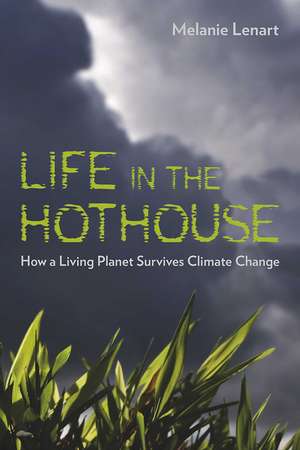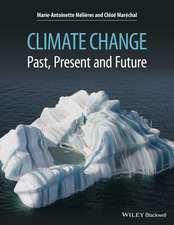Life in the Hothouse: How a Living Planet Survives Climate Change
Autor Melanie Lenarten Limba Engleză Paperback – 14 mai 2010
In this insightful, compelling, and highly readable work, Melanie Lenart, an award-winning journalist and science writer who holds a PhD in Natural Resources and Global Change, examines global warming with the trained eye of a professional scientist. And she presents the science in a clear, straightforward manner. Why does the planet’s warming produce stronger hurricanes, rising seas, and larger floods? Simple, says Lenart. The Earth is just doing what comes naturally. Just as humans produce sweat to cool off on a hot day, the planet produces hurricanes, floods, wetlands, and forests to cool itself off.
Life in the Hothouse incorporates Lenart’s extensive knowledge of climate science—including the latest research in climate change—and the most current scientific theories, including Gaia theory, which holds that the Earth has some degree of climate control “built in.” As Lenart points out, scientists have been documenting stronger hurricanes and larger floods for many years. There is a good reason for this, she notes. Hurricanes help cool the ocean surface and clear the air of carbon dioxide, the main greenhouse gas responsible for global warming. From the perspective of Gaia theory, these responses are helping to slow the ongoing global warming and Lenart expounds upon this in a clear and understandable fashion.
There is hope, Lenart writes. If we help sustain Earth's natural defense systems, including wetlands and forests, perhaps Mother Earth will no longer need to rely as much on the cooling effects of what we call "natural disasters"—many of which carry a human fingerprint. At a minimum, she argues, these systems can help us survive the heat.
Life in the Hothouse incorporates Lenart’s extensive knowledge of climate science—including the latest research in climate change—and the most current scientific theories, including Gaia theory, which holds that the Earth has some degree of climate control “built in.” As Lenart points out, scientists have been documenting stronger hurricanes and larger floods for many years. There is a good reason for this, she notes. Hurricanes help cool the ocean surface and clear the air of carbon dioxide, the main greenhouse gas responsible for global warming. From the perspective of Gaia theory, these responses are helping to slow the ongoing global warming and Lenart expounds upon this in a clear and understandable fashion.
There is hope, Lenart writes. If we help sustain Earth's natural defense systems, including wetlands and forests, perhaps Mother Earth will no longer need to rely as much on the cooling effects of what we call "natural disasters"—many of which carry a human fingerprint. At a minimum, she argues, these systems can help us survive the heat.
Preț: 137.21 lei
Nou
Puncte Express: 206
Preț estimativ în valută:
26.26€ • 27.37$ • 21.86£
26.26€ • 27.37$ • 21.86£
Carte disponibilă
Livrare economică 16-30 decembrie
Preluare comenzi: 021 569.72.76
Specificații
ISBN-13: 9780816527236
ISBN-10: 0816527237
Pagini: 256
Dimensiuni: 152 x 229 x 18 mm
Greutate: 0.33 kg
Ediția:New.
Editura: University of Arizona Press
Colecția University of Arizona Press
ISBN-10: 0816527237
Pagini: 256
Dimensiuni: 152 x 229 x 18 mm
Greutate: 0.33 kg
Ediția:New.
Editura: University of Arizona Press
Colecția University of Arizona Press
Notă biografică
Melanie Lenart is an environmental scientist and writer who specializes in climate change and forests. A researcher with the University of Arizona in Tucson for many years, Lenart now focuses on writing and teaching environmental writing at the university and in workshops.








